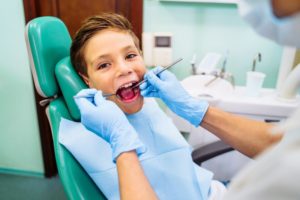
As a devoted parent, you love your child no matter what. Regardless of what they look like, you’ll always love to see them smile. But that doesn’t mean their teeth are perfect. While most kids have 20 primary teeth and 32 permanent ones, some do not. Many require orthodontic treatment or fillings, others experience more rare oral health problems or genetic disorders, which is another important reason to visit the dentist often. To learn more about a few of these rare conditions, keep reading the content below!
Anodontia or Hypodontia
Sometimes, a person can have a genetic disorder that leaves some gaps in their permanent teeth. Those who do not have a full set of permanent teeth experience what is termed as anodontia, which affects 2 to 8 percent of the US population. In this condition, the adult teeth simply don’t develop within the jawbone and therefore don’t erupt. Hypodontia is a genetic disorder in which the child’s mouth fails to create one to five permanent teeth within the arch. Believe it or not, in rare cases of complete anodontia, children do not form any natural teeth at all!
Depending on the severity of the condition, your dentist may recommend dental implants or dentures to give your child a complete, functional smile.
Hyperdontia
While some may struggle with too few teeth, you may find that your child’s smile has too many. With hyperdontia, even one extra tooth can cause overcrowding, bite or tooth misalignment, and other problems. Over time, these issues can cause your child’s teeth to wear down more quickly than they would in perfect alignment.
Although each case may not be treated exactly the same, the extra teeth are often removed to provide adequate spacing for the remaining teeth. Afterward, orthodontic treatment may be necessary to correct any leftover alignment issues.
Gemination
Did you know that a tooth can have one root and two crowns? Tooth gemination occurs when a single root has two pulp chambers, creating a disfigured tooth that is often also extra-large. As a result, the alignment of teeth can be thrown off, and tooth decay becomes more likely, particularly in the area between chambers.
Most of the time, this “problem” is left alone and merely monitored. If it is a primary geminated tooth, the dentist may keep a close eye on it until it falls out. However, extraction may be necessary for permanent teeth or even for some primary teeth.
Overcoming Rare Dental Disorders
If your child faces any of these situations, smiling may be difficult. Not only do you have to deal with functional problems, but they also may deal with aesthetic issues, impacting confidence. If they don’t receive treatment, they could struggle with normal everyday tasks like biting and chewing and feel self-conscious about their teeth.
The great news is that solutions exist and can correct these issues! There is hope for your child to smile with confidence. Even if nature has dealt your child a difficult, rare hand, you can change the game by getting them the treatment they need.
About the Practice
At Pioneer Greens Dentistry, we welcome patients of all ages. Dr. Chris and Dr. Claire Haag have been practicing in Lincoln for more than 25 years and always put each patient’s needs first. With services ranging from routine checkups all the way to implants, we can help your child have a confident smile. If you would like to schedule an appointment at Pioneer Greens Dentistry, you may contact our office online or by calling 402-483-7502.
